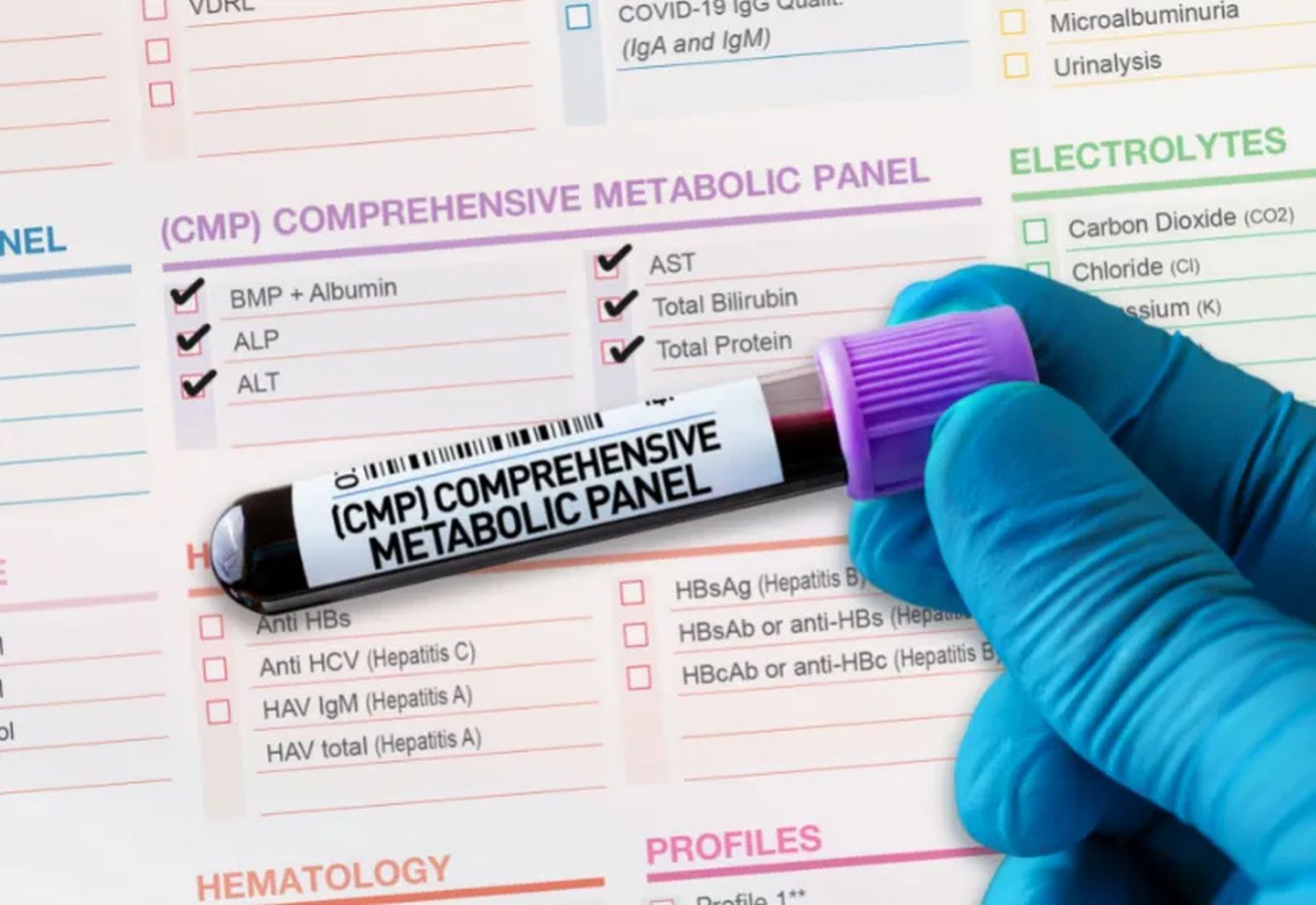Comprehensive Metabolic Panel (CMP): Understanding Your Results

Comprehensive Metabolic Panel (CMP) Test Results: A Complete Breakdown
The Comprehensive Metabolic Panel (CMP) blood test shows your body's metabolic health. This blood test measures chemical components that indicate the health of your liver, kidneys, and electrolyte balance.
Medical professionals use this test during standard health screenings and to check specific medical conditions. The CMP provides medical teams with essential data about organ function, fluid balance, and blood sugar regulation. If you recently received your results an need a personalized explanation regarding what they mean, LabAnalyzer can provide a specific breakdown.
This guide broadly explains each test component and what your results mean for your health.
Components of a CMP Test
The CMP measures 14 different items in three main categories:
Liver Function Tests: Enzymes and proteins that show liver health
Kidney Function Markers: Numbers that show kidney waste filtration
Electrolytes and Glucose Levels: Numbers that show hydration, nerve function, and energy regulation
Each measurement reveals specific information about your health and body functions.
Medical professionals often order CMPs before surgeries, as part of annual physicals, or to monitor chronic conditions. The test requires a blood sample taken after 8-12 hours of fasting for accurate glucose measurements.
Liver Function Test Results Explained
Your CMP checks these liver-related enzymes and proteins:
Alanine Aminotransferase (ALT) and Aspartate Aminotransferase (AST):
These enzymes enter the bloodstream if liver cells sustain damage. Your body stores ALT primarily in liver cells, while AST exists in heart, muscle, and liver tissue.
Normal ALT Levels: 7–56 units per liter (U/L)
Normal AST Levels: 10–40 U/L
High numbers point to liver conditions like hepatitis or cirrhosis
Sustained elevation requires additional liver tests
Physical exercise or muscle injury raises AST levels temporarily
Alkaline Phosphatase (ALP):
ALP breaks down proteins. Your liver and bones contain most of this enzyme. This test helps differentiate between liver and bone disorders.
Normal Levels: 44–147 U/L
High numbers point to liver disease or bone disorders
Growing children show naturally higher ALP levels
Pregnancy raises ALP in the third trimester
Total Protein and Albumin:
These measurements show if your liver makes enough essential proteins. Albumin carries hormones and nutrients through your blood.
Normal Albumin Levels: 3.5–5.0 grams per deciliter (g/dL)
Normal Total Protein Levels: 6.3–7.9 g/dL
Low numbers point to liver disease or malnutrition
Dehydration raises protein levels temporarily
Chronic inflammation reduces albumin levels
Bilirubin:
Bilirubin forms from broken-down red blood cells. Your liver processes this substance. High levels cause jaundice, turning skin and eyes yellow.
Normal Levels: 0.1–1.2 milligrams per deciliter (mg/dL)
High numbers point to liver problems or bile duct issues
Some genetic conditions raise bilirubin without liver disease
Fasting increases bilirubin slightly
Kidney Function Markers in Your CMP
The CMP includes two main kidney health measurements:
Blood Urea Nitrogen (BUN):
BUN shows how well your kidneys remove urea from blood. This waste product comes from protein breakdown.
Normal Levels: 7–20 mg/dL
High numbers point to kidney problems, lack of fluids, or high protein intake
Heart failure raises BUN levels
Low protein diets reduce BUN
Pregnancy lowers BUN levels
Creatinine:
Creatinine comes from muscle use. Your kidneys filter this substance. Muscle mass affects normal ranges.
Normal Levels: 0.6–1.2 mg/dL for men and 0.5–1.1 mg/dL for women
High numbers show reduced kidney function
Low numbers point to low muscle mass or poor nutrition
Athletes show higher creatinine levels
Age affects normal ranges
The BUN-to-creatinine ratio provides extra information about kidney function and fluid status. Normal ratio ranges from 10:1 to 20:1.
Electrolyte Balance Understanding
Electrolytes control fluid balance, nerve function, and muscle movements. The CMP checks:
Sodium (Na):
Controls fluid balance and helps nerves and muscles work. This electrolyte regulates blood pressure.
Normal Levels: 135–145 milliequivalents per liter (mEq/L)
Abnormal numbers point to fluid problems, kidney issues, or hormone changes
Excessive sweating reduces sodium levels
Some medications affect sodium balance
Potassium (K):
Supports heart function and muscle movements. This electrolyte affects heart rhythm significantly.
Normal Levels: 3.5–5.0 mEq/L
Low numbers cause muscle weakness
High numbers affect heart rhythm
Some blood pressure medications change potassium levels
Diet strongly influences potassium balance
Chloride (Cl):
Maintains acid-base balance and fluid levels. This electrolyte works closely with sodium.
Normal Levels: 96–106 mEq/L
Numbers often change with sodium levels
Vomiting reduces chloride levels
Kidney problems affect chloride balance
Carbon Dioxide (CO2):
Shows blood acid-base balance. This measurement reflects your breathing efficiency.
Normal Levels: 23–30 mEq/L
Unusual CO2 numbers point to breathing or metabolic issues
Lung diseases change CO2 levels
Severe diarrhea affects CO2 balance
Glucose Level Interpretation
Glucose provides energy for your body. Your glucose control affects metabolic health.
Normal Fasting Glucose Levels: 70–99 mg/dL
Prediabetes Range: 100–125 mg/dL
Diabetes Diagnosis: 126 mg/dL or higher on multiple tests
High glucose numbers point to diabetes or stress. Low glucose numbers point to hypoglycemia or metabolic disorders.
Common factors that affect glucose levels:
Time elapsed after eating
Exercise intensity and timing
Medications, particularly steroids
Infections or illness
Hormonal changes
When to Consult Your Doctor About CMP Results
Your overall health, medical background, and symptoms affect CMP result analysis. Call your doctor if:
Your test shows several numbers outside normal ranges
You notice unexplained symptoms like tiredness, swelling, or changes in urination
Your results show liver, kidney, or metabolic problems
These signs need prompt medical evaluation:
Severe fatigue or weakness
Yellow skin or eyes
Dark urine or changes in urination patterns
Unexplained weight loss
Persistent nausea
Swelling in legs or abdomen
Key Takeaway
The Comprehensive Metabolic Panel reveals your metabolic and organ health status.
Understanding your CMP results helps you work with your medical team to maintain good health. Regular CMP testing creates a baseline for your health measurements and spots changes early.
Medical professionals use these results to:
Screen for diabetes and pre-diabetes
Check liver and kidney function
Monitor existing health conditions
Guide medication adjustments
Plan treatment strategies
Tools like LabAnalyzer.org offer specific analysis of your test results.